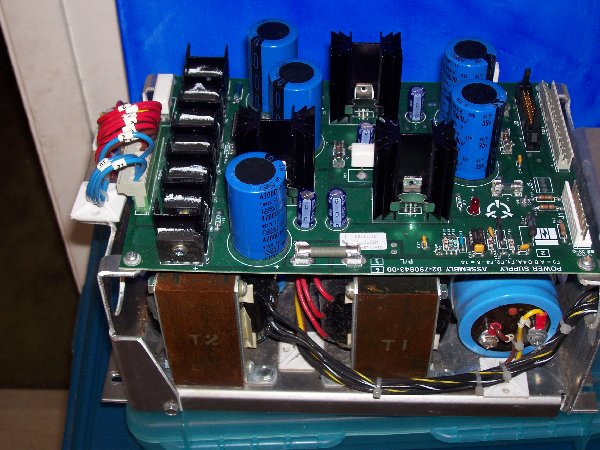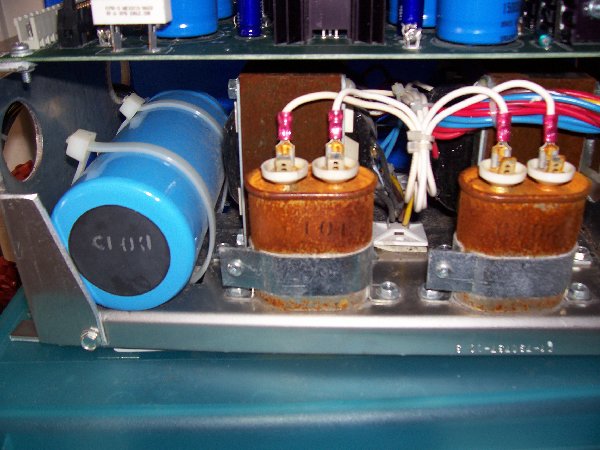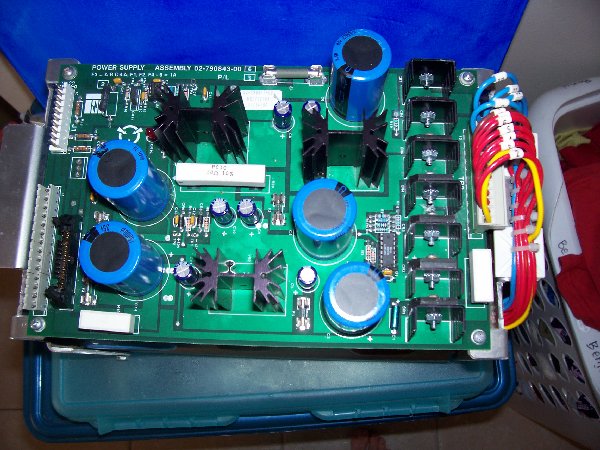| Author |
Message |
loss1234

Joined: Jul 24, 2007
Posts: 1536
Location: nyc
Audio files: 41
|
 Posted: Sun Feb 24, 2008 9:39 am Post subject:
by the curb:giant capacitors-great find!! what is it?? Posted: Sun Feb 24, 2008 9:39 am Post subject:
by the curb:giant capacitors-great find!! what is it?? |
  |
|
I found this out in the garbage!! It looks like a super heavy duty power supply.
But what are those rusty parts (batteries?) and is that GIANT blue tube in the bottom a really really big CAPACITOR??
i wonder if it still works..those transformers are BIG~ this thing weighs a ton.
thanks
| Description: |
|
| Filesize: |
770.3 KB |
| Viewed: |
165 Time(s) |
| This image has been reduced to fit the page. Click on it to enlarge. |

|
| Description: |
| what are these rusted parts? |
|
| Filesize: |
842.84 KB |
| Viewed: |
181 Time(s) |
| This image has been reduced to fit the page. Click on it to enlarge. |

|
| Description: |
|
| Filesize: |
757.7 KB |
| Viewed: |
181 Time(s) |
| This image has been reduced to fit the page. Click on it to enlarge. |

|
_________________
-------------------------------------------- check out various dan music at: http://www.myspace.com/lossnyc
http://www.myspace.com/snazelle
http://www.soundclick.com/lossnyc.htm http://www.indie911.com/dan-snazelle |
|
|
Back to top
|
|
 |
gavgomad
Joined: Jan 29, 2006
Posts: 69
Location: Canada
|
 Posted: Sun Feb 24, 2008 9:56 am Post subject: Posted: Sun Feb 24, 2008 9:56 am Post subject:
|
  |
|
According to this website...
http://www.qie.com/e.html
... it's an Emerson Power Supply. For what sort of beastie, though, your guess is as good as mine! 
It looks as though Emerson do power supplies for networking installations....
Gav. |
|
|
Back to top
|
|
 |
Danno Gee Ray
Joined: Sep 25, 2005
Posts: 1351
Location: Telford, PA USA
|
 Posted: Sun Feb 24, 2008 10:12 am Post subject: Posted: Sun Feb 24, 2008 10:12 am Post subject:
|
  |
|
| Those rusted metal cans look like motor start capacitors. |
|
|
Back to top
|
|
 |
blue hell
Site Admin

Joined: Apr 03, 2004
Posts: 24498
Location: The Netherlands, Enschede
Audio files: 298
G2 patch files: 320
|
 Posted: Sun Feb 24, 2008 10:19 am Post subject: Posted: Sun Feb 24, 2008 10:19 am Post subject:
|
  |
|
| Danno Gee Ray wrote: | | Those rusted metal cans look loke motor start capacitors. |
Maybe they are for power factor correction, would be useful for large power supplies.
_________________
Jan
also .. could someone please turn down the thermostat a bit.
 |
|
|
Back to top
|
|
 |
Danno Gee Ray
Joined: Sep 25, 2005
Posts: 1351
Location: Telford, PA USA
|
 Posted: Sun Feb 24, 2008 12:05 pm Post subject: Posted: Sun Feb 24, 2008 12:05 pm Post subject:
|
  |
|
| Excellent. Very educational. Thank you. |
|
|
Back to top
|
|
 |
RF

Joined: Mar 23, 2007
Posts: 1502
Location: Northern Minnesota, USA
Audio files: 28
|
 Posted: Sun Feb 24, 2008 4:33 pm Post subject:
Re: by the curb:giant capacitors-great find!! what is it?? Posted: Sun Feb 24, 2008 4:33 pm Post subject:
Re: by the curb:giant capacitors-great find!! what is it?? |
  |
|
| loss1234 wrote: | | But what are those rusty parts |
Those rusted ones are "oil filled" capacitors - usually rated for higher voltages and lower capacitances.
The big blue electrolytic one is likely just the opposite - higher capacitance at lower voltages. The values are probably printed on those somewhere.
Rusty oil filled caps - ewe. The thing is 'probably' too new to worry about PCB's in the oil...but they'll leak on you eventually.
bruce |
|
|
Back to top
|
|
 |
loss1234

Joined: Jul 24, 2007
Posts: 1536
Location: nyc
Audio files: 41
|
|
|
Back to top
|
|
 |
danielwarner
Joined: Dec 18, 2006
Posts: 65
Location: Sacramento
|
 Posted: Mon Feb 25, 2008 6:29 am Post subject: Posted: Mon Feb 25, 2008 6:29 am Post subject:
|
  |
|
| Be careful with those big capacitors, discharge them before you dissect the thing, use a screwdriver and short the two leads together while you're holding only the plastic handle. Seriously I've heard of people burned from big capacitors before, I don't know the values or at what threshold they become dangerous, I'd just take some precautions. |
|
|
Back to top
|
|
 |
RF

Joined: Mar 23, 2007
Posts: 1502
Location: Northern Minnesota, USA
Audio files: 28
|
 Posted: Mon Feb 25, 2008 6:57 am Post subject: Posted: Mon Feb 25, 2008 6:57 am Post subject:
|
  |
|
| danielwarner wrote: | | Be careful with those big capacitors, discharge them before you dissect the thing |
I'm reminded of a certain "RF" tech who many years ago discharged a very large 700 volt oil filled filter cap through his body.... It felt like someone hit him with a baseball bat - and he hit the wall hard on the other side of the room. Immediately, his high voltage safety proceedures got significantly more rigorous.
Don't ask me how I know about it. |
|
|
Back to top
|
|
 |
Clack

Joined: Aug 08, 2005
Posts: 438
Location: Walthamstow - london
Audio files: 5
G2 patch files: 1
|
 Posted: Mon Feb 25, 2008 7:01 am Post subject: Posted: Mon Feb 25, 2008 7:01 am Post subject:
|
  |
|
| danielwarner wrote: | | Be careful with those big capacitors, discharge them before you dissect the thing, use a screwdriver and short the two leads together while you're holding only the plastic handle. Seriously I've heard of people burned from big capacitors before, I don't know the values or at what threshold they become dangerous, I'd just take some precautions. |
Um id be carefull doing that as well, they tend to spark if they are big - I dont know much about it - but you need to put a resistance in the discharging line so its not a massive flow of current all at once. A high watt resistor or somthing
_________________
Clacktronics.co.uk |
|
|
Back to top
|
|
 |
Uncle Krunkus
Moderator

Joined: Jul 11, 2005
Posts: 4761
Location: Sydney, Australia
Audio files: 52
G2 patch files: 1
|
 Posted: Mon Feb 25, 2008 7:04 am Post subject: Posted: Mon Feb 25, 2008 7:04 am Post subject:
|
  |
|
If you want to use them later, don't use a screwdriver. These big caps don't like being discharged so quickly, and it will seriously shorten their life. (You don't know how much life they have left, so why waste it?) Even just a 1Kor 2K 5W resistor will do the job alot less stressfully. Hold it with a pair of pliers.
_________________
What makes a space ours, is what we put there, and what we do there. |
|
|
Back to top
|
|
 |
RF

Joined: Mar 23, 2007
Posts: 1502
Location: Northern Minnesota, USA
Audio files: 28
|
 Posted: Mon Feb 25, 2008 7:16 am Post subject: Posted: Mon Feb 25, 2008 7:16 am Post subject:
|
  |
|
I'm sure there must be bleeder resistors on those caps - so unless they have failed (which happens) those caps would be discharged.
Throw a voltmeter on and take a look before you stress too much over the big spark possibility  |
|
|
Back to top
|
|
 |
danielwarner
Joined: Dec 18, 2006
Posts: 65
Location: Sacramento
|
 Posted: Mon Feb 25, 2008 7:26 am Post subject: Posted: Mon Feb 25, 2008 7:26 am Post subject:
|
  |
|
Whoops, my "screwdriver short" advice was derived from a guy I know who restores old televisions, radios, etc... I suppose he simply tosses the caps once they've been removed... or houses new caps inside the old ones, I've read about people doing that.
"I'm reminded of a certain "RF" tech who many years ago discharged a very large 700 volt oil filled filter cap through his body.... It felt like someone hit him with a baseball bat - and he hit the wall hard on the other side of the room. Immediately, his high voltage safety proceedures got significantly more rigorous. Don't ask me how I know about it."
Once of my teachers at school has his position because the guy who previously filled his position is dead. He was a licensed electrician, working in a basement somewhere. He had removed the safety ground plug from an electric drill with a metal chassis, for some reason had his neck against a water pipe, and accidentally drilled into the mains. The current went right through his brain stem, well above the "let go" threshold, and the home owner found him dead in the basement several hours later. 
Anything high voltage, high current frightens me, with good reason. |
|
|
Back to top
|
|
 |
Uncle Krunkus
Moderator

Joined: Jul 11, 2005
Posts: 4761
Location: Sydney, Australia
Audio files: 52
G2 patch files: 1
|
 Posted: Mon Feb 25, 2008 7:30 am Post subject: Posted: Mon Feb 25, 2008 7:30 am Post subject:
|
  |
|
Nasty! 
I've been bitten a few times by 240VAC.
R_E_S_P_E_C_T........ 
_________________
What makes a space ours, is what we put there, and what we do there. |
|
|
Back to top
|
|
 |
RF

Joined: Mar 23, 2007
Posts: 1502
Location: Northern Minnesota, USA
Audio files: 28
|
 Posted: Mon Feb 25, 2008 7:33 am Post subject: Posted: Mon Feb 25, 2008 7:33 am Post subject:
|
  |
|
Hey Daniel -
I use the screwdriver ALL the time on big caps I "know" to be discharged.
It's solid advice, and my standard procedure as a last assurance the thing is completely flat.
I also strap the terminals on big caps after removing them from service and keep new large caps strapped in storage. |
|
|
Back to top
|
|
 |
factus10
Joined: Jun 20, 2007
Posts: 158
Location: Buffalo, NY
|
 Posted: Mon Feb 25, 2008 10:25 am Post subject: Posted: Mon Feb 25, 2008 10:25 am Post subject:
|
  |
|
| I know this'll sound apocryphal, but a friend (really!) used to use the screwdriver method too until one of the caps welded his screwdriver to the terminal.... If you do use a screwdriver, use a decent resistor to limit the rate of discharge. |
|
|
Back to top
|
|
 |
|

